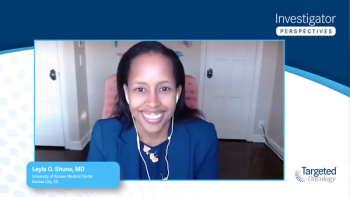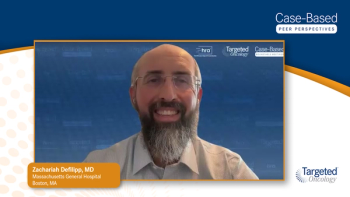
Driving Precision Medicine Through Molecular Testing in NSCLC
Patrick Forde, MBBCh, and Tina Cascone, MD, PhD, discuss the role of molecular profiling to guide precision treatment decisions in non-small cell lung cancer, including the impact of PD-L1 status on neoadjuvant and perioperative approaches.
Episodes in this series

This is a video synopsis/summary of a Precision Medicine featuring Patrick Forde, MBBCh, and Tina Cascone, MD, PhD.
Forde and Cascone discuss the evolution of molecular testing for patients with non–small cell lung cancer (NSCLC). Over the past decade, the quantity and extent of testing have rapidly increased. Previously, testing focused mainly on patients with advanced nonsquamous cancers for actionable genomic alterations such as EGFR and ALK. Currently, it is recommended to test virtually all patients with advanced disease for molecular aberrations that can inform targeted therapy decisions, using broad-based next-generation sequencing per National Comprehensive Cancer Network guidelines. Molecular testing is also considered for early-stage disease due to implications for patients with EGFR or ALK alterations who may be eligible for adjuvant targeted therapy.
The role of PD-L1 in informing neoadjuvant and perioperative treatment decisions is also discussed. The magnitude of benefit with immunotherapy approaches is greater according to PD-L1 expression, with a deeper benefit in patients whose tumors have a PD-L1 expression of 50% or higher. However, PD-L1 status should not be the sole factor influencing treatment decisions, as there may be benefit in patients whose tumors do not express PD-L1. Other factors, including stage, combine with PD-L1 to inform patient disposition to neoadjuvant, perioperative, or adjuvant treatment.
Video synopsis is AI-generated and reviewed by Targeted Oncology™ editorial staff.




















